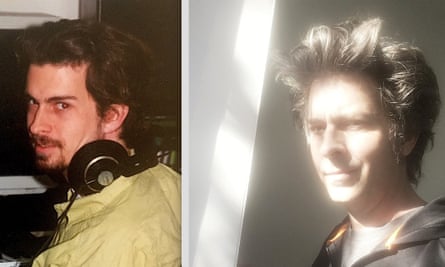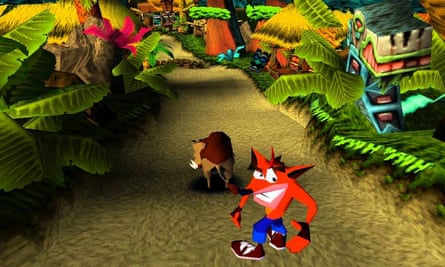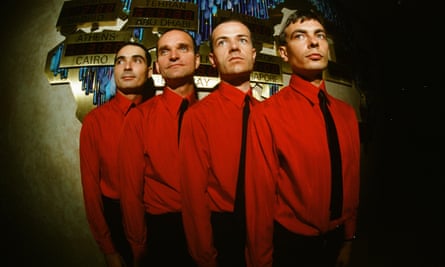‘When people are playing video games, they want to have fun,” Josh Mancell, composer for Naughty Dog’s early Crash Bandicoot games, tells me. It’s a simple statement, but one that laid the foundations for everything the PlayStation’s most famous mascot would come to represent. Even when players were banging their heads against their CRT TVs in frustration as the paranoid, eerie music of Slippery Climb began playing again for the hundredth time, Crash Bandicoot was fun. And Mancell’s soundtrack was there, from beginning to end, to remind you of that.
The characteristically eccentric, manic energy that fuelled Crash’s madcap platforming adventures didn’t come out of nowhere, though. “As I was working on the game, I was definitely throwing stuff against the wall to see what would stick,” Mancell says.
Crash was never as fast as Sonic, and wasn’t as approachable as Mario. He was scruffier, edgier, more of an underdog than his sanitised mainstream stablemates. And the music captured that; it was insistent, encouraging, offbeat. A bit daft, a Looney Tunes cartoon that got into the sugar and accidentally wandered into the third dimension. But that upbeat, Hawaiian surf-rock vibe was nearly something else entirely.
Early drafts of the score for the first Crash Bandicoot game were ambient, drum-heavy, focused on creating a sonic jungle around Crash that made you feel like you were on this perilous island with him – surrounded by flora that were as lethal as the fauna. This music actually sounded a lot like one of Mancell’s earliest projects as a composer, which was a commercial for Kraft cheese in the US. “The commercial is this little kid talking about going through the jungle, and it was all animated, and even the beat that I used there was very similar to one of the ones that end up in Crash.
“The earlier, more ambient stuff works for what it is; it gets you into the jungle, it gets you into the immersive nature of what a game should be.”

But Crash Bandicoot isn’t Uncharted or The Last of Us; Mancell was working with Naughty Dog in its “punk” era, when it created Crash as a rival to (and parody of) Sonic the Hedgehog. The developer’s “Hollywood” era was still two generations off, and for now, the music needed to be zany, quirky – more Saturday morning cartoon than primetime TV show.
And it was one of Crash Bandicoot’s most infamous levels – Hog Wild – that provided the inspiration Mancell needed to fit himself firmly into Crash’s baggy jorts. “Hog Wild was such a turning point, especially in terms of the feedback I was getting on the music,” he says. “I was getting pointed in the direction of doing more of an ‘experimental’ score – all percussion and ambience, you know? Environmental sounds, things like that. And I think that the reaction was split, let’s say.”
Some of the producers at publisher Universal were not convinced by this more experimental approach. Mancell has previously been cited as referencing the likes of Aphex Twin and Juan Atkins in these early scores, but that’s not quite right; Mancell says he admires the way those musicians made a deep, identifiable soundscape with limited space and tools – and that was something he was keen to do with Crash, more than “ape the sort of music they were making”. We were never going to get something like Alberto Balsalm in Crash Bandicoot, really, were we?

“The Hog Wild music was more … I don’t want to say Universal, as a pun … but it was more comical,” says Mancell. “People laughed at it, and it started to feel as if there was more of a positive reaction. It didn’t sound like Mario music, but it sounded like its own version of that; more animated, more character-driven.”
If you’re riding on the back of a hog, jumping over things, “this is what it should sound like,” Mancell points out. And he’s right. Both in the music, and in the game, Hog Wild is the point where you lock into what Crash Bandicoot is. This is where the game deviates from its peers – the Marios and Sonics of 2D platform infamy. Hog Wild is the eighth level in the game and represents what Crash needed to be: fun, fast, reckless, stupid. A perfect mascot for Sony and its fledgling PlayStation console.
“[Hog Wild] was the eye-opener, that was when I started to see what the game was looking like: you’re playing a cartoon, you’re a character in a cartoon. The guy that designed the characters had some involvement in Looney Tunes, right? Charles Zembillas brought that sensibility to the game before I even stepped in.”
Mancell is a drummer, first and foremost, and you can hear that in how Crash Bandicoot’s melodies – from the first game right the way through to Crash Team Racing – are all so percussive and insistent. The same way you can tell that Dave Grohl approaches writing vocal parts from the perspective of a drummer, you can tell Mancell has a rhythmic heart; everything in Crash feels groovy, encouraging, indefatigable. He references, explicitly, Stewart Copeland of the Police as an influence in this regard (“one of my favourite drummers of all time” to whom the ruins level in Crash 2 is a direct “tip of the hat”). This creates an interesting loop; two years after Crash Bandicoot launched, Copeland would begin scoring the Spyro the Dragon series – a coincidence that’s not lost on Mancell.
Once Crash found his legs – or his “ass”, given that it was referred to as “Sonic’s ass game” in development thanks to your constant focus on Crash’s polygonal posterior – Mancell felt emboldened. Crash 2 (Cortex Strikes Back) and 3 (Warped) became more “musical”, per the composer, and he started to draft in more of his personal style, free to take this blossoming franchise (freshly encouraged by a very unexpected Japanese success) into the stratosphere.

“For [Crash 2 and 3], I worked with a producer from Naughty Dog on a lot of the music, and I would bang out all my ideas and he would come in once a week to listen to it and we’d make tweaks from there. He was third in command at Naughty Dog, Dave Baggett, and a huge music fan. We’d struck up this incredible friendship and partnership – and we shared an interest in Kraftwerk.”
You can hear that in the music; for a few bars in the sewer levels in Crash Bandicoot 2 and the future levels in Crash Bandicoot 3, you would be forgiven for thinking you’re listening to Kraftwerk B-sides – elbow-in-the-ribs pastiches of 80s electronica, lampooning (and paying homage to) pioneers of the genre.
That’s what Crash Bandicoot was designed to do: to be fun, to put PlayStation on the map and offer an alternative take on the increasingly formulaic mascot platformers proliferating on other consoles.
Without Mancell’s music, Crash Bandicoot wouldn’t have been as successful, as memorable or as irreverent. To my ear, the PlayStation trilogy of games remains one of the most perfectly executed examples of joyful, high-energy music we’ve experienced in the medium, and set a high bar for the generations to follow.

Comments (…)
Sign in or create your Guardian account to join the discussion